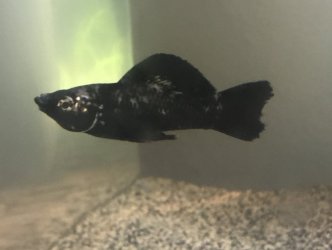Poor water quality can cause bacterial and protozoan infections. Keep the fish in good water and add some salt for a couple of weeks, and it should be fine.
You can add rock salt (often sold as aquarium salt), sea salt or swimming pool salt to the aquarium at the dose rate of 1 heaped tablespoon per 20 litres of water. If there is no improvement after 48 hours you can double that dose rate so there is 2 heaped tablespoons of salt per 20 litres.
If you only have livebearers (guppies, platies, swordtails, mollies), goldfish or rainbowfish in the tank you can double that dose rate, so you would add 2 heaped tablespoons per 20 litres and if there is no improvement after 48 hours, then increase it so there is a total of 4 heaped tablespoons of salt per 20 litres.
Keep the salt level like this for at least 2 weeks but no longer than 4 weeks otherwise kidney damage can occur. Kidney damage is more likely to occur in fish from soft water (tetras, Corydoras, angelfish, gouramis, loaches) that are exposed to high levels of salt for an extended period of time, and is not an issue with livebearers, rainbowfish or other salt tolerant species.
The salt will not affect the beneficial filter bacteria but the higher dose rate will affect some plants. The lower dose rate will not affect plants.
After you use salt and the fish have recovered, you do a 10% water change each day for a week using only fresh water that has been dechlorinated. Then do a 20% water change each day for a week. Then you can do bigger water changes after that. This dilutes the salt out of the tank slowly so it doesn't harm the fish.



